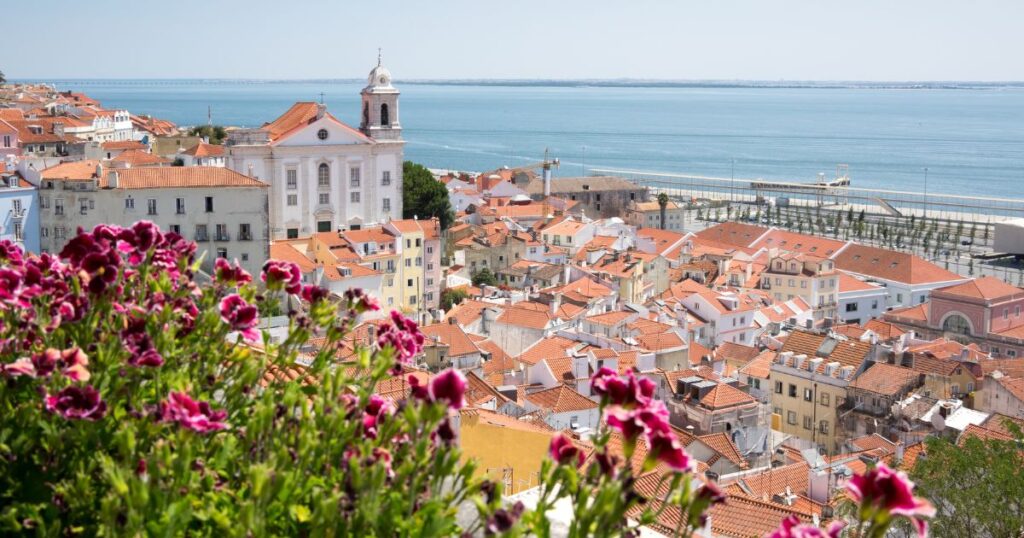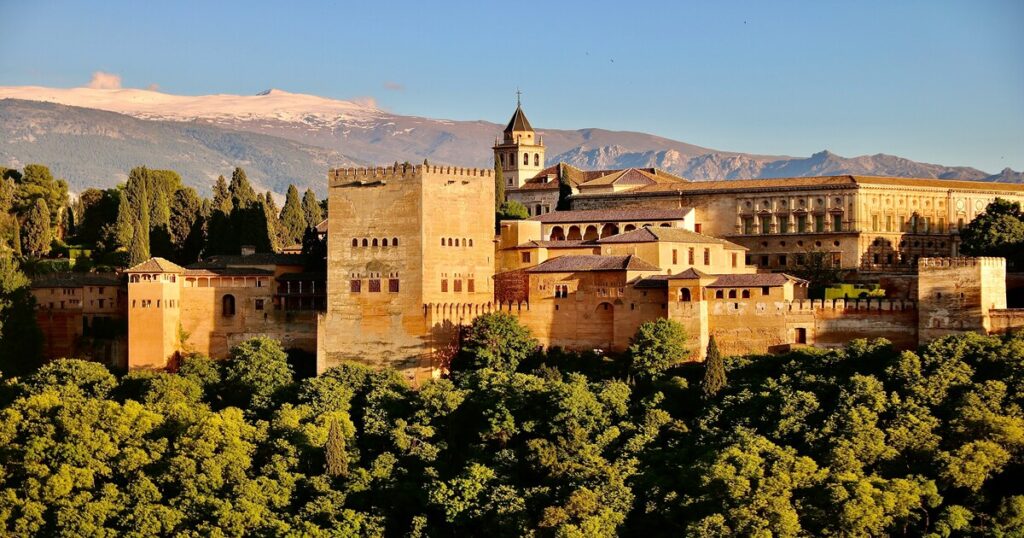From bustling cosmopolitan cities like Lisbon and Porto to sun-soaked beach towns such as Costa Nova and Peniche, as well as the lush Douro Valley and Pico Island wine regions, Portugal boasts a range of exciting retirement destinations. Fortunately for Americans, the cost of living in Portugal is a fraction of what it is in the US — making it no surprise that more and more Americans are choosing to retire in Portugal.
Of course, there’s a lot of research to do and angles to consider before deciding to retire abroad. Read on to learn all about taxes, the cost of living, and healthcare in Portugal for expats.
Benefits of retiring in Portugal

Some of the things Portugal is most known for include:
- Beautiful sunny weather year-round
- Stunning geography (cliffsides, plains, beaches, mountains, forests)
- A variety of picturesque cities, towns, and villages
- Delicious food, like pastéis de nata (custard tarts), piri-piri chicken, and tons of fresh seafood
- World-famous Port and Madeira wines
- A rich culture, from fado music to azulejo tile art
Combine that with the affordable cost of living, high quality of life, and excellent healthcare system, and Portugal is a wonderful place to retire.
Best place to retire in Portugal
Some of the more popular places for Americans to retire in Portugal include:
- Porto: The second-largest city, known for its signature Port wine, Baroque architecture, São João festival, and indulgent cuisine
- Madeira: An island chain known for its signature Madeira wine, mild weather, natural landscapes, and hiking trails
- The Algarve: The southernmost region in Portugal, known for its sandy beaches, fishing villages, golf courses, and thriving expat community
- Alentejo: A rural region known for its rolling hills, relaxed pace of life, sprawling villas, and olive groves
- Lisbon: The capital city, known for its colonial architecture, historic neighborhoods, scenic hilltop vistas, and bustling markets
Portugal retirement visa US expats

Retirement in Portugal for US citizens requires a long-term stay visa. The most popular Portugal retirement visa for US citizens is the D7 visa.1
The D7 visa is for non-EU residents who have enough savings or passive income to sustain themselves financially in Portugal. While the term “D7 visa” is often used interchangeably with “Non-Habitual Resident (NHR),” it’s crucial to understand that the D7 visa and NHR are distinct from one another. The difference:
- The D7 visa is the means by which non-EU residents may obtain a residence permit to live in Portugal long-term.
- NHR is a beneficial tax regime that requires a separate application process, which eligible expats undertake upon arrival in Portugal.
What is the Non-Habitual Resident (NHR) tax scheme?
The NHR tax scheme was established in 2009 to attract wealthy individuals from around the world to Portugal. Key benefits of the regime include the provision of a 10-year tax break, which we detail further below. Additionally, holders retain the ability to engage in professional activity in Portugal and pay no wealth tax.
To reiterate: The NHR can only be obtained via application from within Portugal once you’ve arrived. This means that if you intend to retire in Portugal on the D7 visa, you would take the following steps, in order:
- Obtain the visa
- Arrive in Portugal
- Coordinate your application for the NHR.
How to qualify for the D7 visa
The Portugal retirement visa income requirement is €760 (~$840) per month in passive income for individuals, or 12 months’ worth of savings (€9,120, or ~$10,080 ). Applicants must also show proof of accommodation in Portugal and stay in the country for over 183 consecutive days per calendar year.
Previously, Portugal also offered the Golden Visa (D2 visa), geared toward investors. However, they recently shut the program down, citing rising housing costs.2
📢 October 2023 update on the Non-Habitual Resident (NHR) tax regime
In an interview with CNN Brazil on October 4, 2023, Portugal’s Prime Minister, Antonio Costa, announced that the government is ending the NHR tax scheme.
Reasons behind the ending of NHR
A standout pressure point is the ever-rising cost of housing in cities such as Lisbon and Porto. The influx of wealthy foreigners combined with opportunistic landlords produced severe housing inflation. For years now, Portuguese people have been priced out of their own neighborhoods and cities.
The resulting political backlash has been intense. Many viewed the ending of the Golden Visa in its current form as a signal that the NHR tax regime could be next. Now that it’s officially on the chopping block, many foreigners are racing to submit their visa applications in the hopes of arriving in time to apply for the NHR scheme.
US citizens planning to move to Portugal should know that the D7 visa remains an immigration pathway. However, the main change is that the tax rate on their retirement income (and earned income, if applicable) will dramatically increase if they’re not eligible for NHR, or NHR ceases to exist. It’s crucial that retirement expectations be aligned with this news moving forward, particularly as it relates to planning and budgeting for retirement in Portugal.
–Alex Ingrim, Chartered MSCI at Chase Buchanan USA
How long does it take to get a visa to live in Portugal?
The typical processing time for Portugal’s retirement visa is approximately four months. However, given the current circumstances, interested applicants may benefit from working with a certified immigration lawyer to expedite the process. (Kindly note our caveat on this advice below.)
As a baseline, you will need to gather and complete the required documents:
- Visa application form
- Background check authorization
- Valid passport
- Two passport-sized photos
- Proof of travel & health insurance
- Six months’ worth of bank statements
- Proof of income
- Proof of accommodation
- A clean criminal record
🚩A word of caution:
Some companies are charging exhorbitant prices guaranteeing a streamlined D7 visa application and subsequent acceptance into the NHR tax scheme. Always be wary of "guarantees" and take care to research these companies thoroughly. We also recommend cross-referencing sales and success-rate claims with objective professionals in the global mobility field to insulate yourself as much as possible from scams.
Healthcare in Portugal for US expats

Many retirees wonder: Is healthcare free in Portugal? For citizens and permanent residents, it is effectively free (besides the taxes that fund the system).
Portugal’s national healthcare system, known as the Serviço Nacional de Saúde (SNS), is free for all residents. It is free to all residents of Portugal. However, holders of Portugal’s retirement visa aren’t entitled to Portugal’s healthcare system right away.
When you receive your D7 visa, you will need to validate it when you arrive in Portugal. Validating your visa activates your Portuguese residency status. This in turn allows you to register yourself in the national healthcare system. However, all visa applicants will be asked to provide proof of private health insurance at the beginning of their stay. This is to ensure that they are covered in the interim between arriving and validating their visa.
The good news is that private healthcare for expats in Portugal is generally high-quality and more affordable than it is in the US. The cost of private healthcare in Portugal is typically between €20 and €50 per month,3 but it may be more depending on factors like your age and pre-existing conditions.
How much does it cost to retire in Portugal?
In smaller towns, the cost of living in Portugal for retirees is often about €1,400 to €1,800 (~$1,500 to $2,000) per month.4 In bigger cities, you’ll likely spend between €1,800 and €3,200 (~$2,000 to $3,500) per month.5 Of course, that estimate can vary greatly depending on your lifestyle.
What is the average income in Portugal?
A report by the publisher ECO6 found that the average salary in Portugal for 2021 was below €22,000 (~$24,300).
Retiring in Portugal on Social Security: Considerations
In 2023, the average income in Portugal is less than the annual Social Security benefit for 65-year-old Americans, set at $30,708.7 This translates to $2,559 a month, suggesting that, in theory, one could live in Portugal solely on Social Security, though it might be a tight budget. Coming out to $2,559 a month, you could theoretically live off of Social Security alone in Portugal, although it would likely be pretty tight. Keep in mind, too, that some receive less in Social Security benefits than others, and benefits are often still taxable.
If you pad those Social Security payments out with some savings, however, you can live quite comfortably in Portugal.
Do Americans pay tax in Portugal?

Americans in Portugal with the D7 retirement visa might face taxation from both Portuguese and US governments. However, this doesn’t automatically imply double taxation on identical income.
Portuguese taxes
D7 visa holders currently enjoy specific tax benefits in Portugal. Under the Non-Habitual Resident (NHR) tax scheme, they are taxed at 20% for Portuguese-sourced income and 10% for foreign-sourced income, which encompasses foreign retirement and social security payments.8
Considering that typical Portuguese income tax rates reach up to 48%, this can lead to significant savings through residency under the D7 visa. What’s more, the NHR tax scheme lasts for a full ten years. So, even if you’re granted permanent residence in Portugal after five years of living there, you can continue to benefit from NHR status for five additional years.
US taxes
All US citizens and permanent residents, including those residing abroad, must pay taxes on their global income if they meet the minimum income thresholds. There are tax breaks that can offer relief for expat retirees, however, such as the:
- Foreign Tax Credit (FTC): The Foreign Tax Credit allows US expats to essentially subtract what they have paid in income taxes to a foreign government from what they owe to the US government (though as with all things US-tax related, it’s not quite that simple).
- Foreign Earned Income Exclusion (FEIE): Allows those who qualify to exclude up to $120,000 of foreign-earned income (for tax year 2023) from taxation.
- Foreign Housing Exclusion: Expats who meet either the Physical Presence Test or the Bona Fide Residence Test can use the Foreign Housing Exclusion to write off qualifying housing expenses like rent, utilities, property insurance, and more.
Also, remember that:
- Withdrawals from post-tax retirement accounts, like Roth IRAs and Roth 401(k)s, are tax-free
- Only up to 85% of your social security payments are subject to taxation
References:
- Portugal D7 Visa 2023: Ultimate Guide
- Portugal will no longer issue ‘golden’ EU visas
- Health Insurance and Healthcare in Portugal Explained
- The Complete Guide to Retiring in Portugal
- How to Retire in Portugal: A Complete Guide
- What is the average salary in Portugal?
- What Is the Average Social Security Benefit at 65?
- Guide to the Non-Habitual Resident (NHR) Tax Regime







